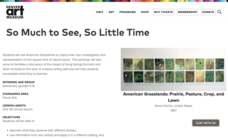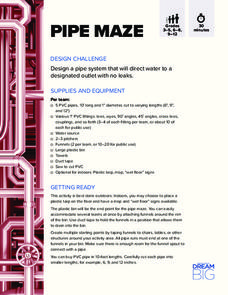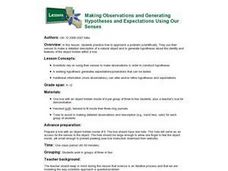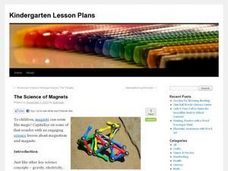PBS
Lessons - Feeling Hot, Hot, Hot!
Volcanoes are among the most spectacular geological features on the planet. Jump into an exploration of these amazing phenomenon with this multimedia lesson plan series. Working collaboratively in small groups, young scientists view...
Cal Recycle
Conserving Natural Resources
Trying to plan an engaging elementary science unit on natural resources? Conserve your energy! This five-part series of lessons and hands-on activities has exactly what you need to teach young scholars about the importance of conservation.
Denver Art Museum
So Much to See, So Little Time
How do humans and animals impact the environment? What is land division? Youngsters tape off a 12x12 inch square in an outdoor natural space. They sketch everything they see, then compare their drawings as a class. They will then be...
Curated OER
Science: The States of Matter
Third graders conduct experiments in matter to create chemical changes resulting in gases. By mixing solids and liquids, they create a chemical reaction and capture the gas in balloons. After observing the balloons fill with carbon...
Omaha Zoo
I Like to Move It
What do lemurs do best? They move! Lemurs like to jump, run, hop, and climb and it's your class's job to document seven fun lemur behaviors. The class starts by discussing why lemurs are considered primates, and then they isolate seven...
Curated OER
Make a Solar Sill
Students design a solar still and purify water. In this earth process and design lesson, students observe how the heat of the sun helps to purify water. Students analyze why this could be helpful on a desert island. Students record...
Big Kid Science
Measuring Shadows Using an Ancient Method
How did ancient peoples determine the height of really tall objects? Young scientists and mathematicians explore the concept of using shadows to measure height in a hands-on experiment. Paired pupils measure shadows, then calculate the...
Nuffield Foundation
Observing Water Moving Through Plants
We know plants assist in the water cycle, but how do plants get water from the ground into the air? Through a series of demonstrations or labs, scholars observe the movement of water through plants. They microscopically view the cells...
DiscoverE
Pipe Maze
Here's a lesson that is simply a-MAZE-ing! Introduce science scholars to pipeline systems through a hands-on project. Partnered pupils participate in the design, construct, and test a PVC pipeline maze. Reusable materials and clear...
Curated OER
Observation Milk Fat Lesson
Turn your class loose to experiment with the different fat content in skim milk, whole milk, half and half, and heavy cream. This is a visually vibrant experiment, as learners drip food coloring on the surface of the products and measure...
Teach Engineering
What Makes Our Bones Strong?
So is that what you meant by rubber legs? The activity has pairs subject a chicken bone to vinegar and observe what happens over a period of days. Individuals then write up a lab report and document their observations and findings.
Curated OER
Making Clouds
In collaborative groups, mini-meteorologists investigate the conditions that must be present for clouds to form: cooling air, water vapor, and condensation nuclei. In addition to procedures, a chart for observations and some follow-up...
Curated OER
Earth's Water: A drop in your cup
Students complete activities where they observe the amount of freshwater in the world as a fraction of the actual amount of water using different mixtures. In this freshwater lesson plan, students brainstorm on how to preserve freshwater.
Nuffield Foundation
Microscale Investigations of Catalase Activity in Plant Extracts
Use indirect measurements to monitor metabolic activity in plant cells. Scholars understand that cells with a higher metabolic rate have a higher concentration of catalase enzyme. They use this information to compare metabolic rates of...
Nuffield Foundation
Making Up Nutrient Agars
A resource rich in information—and nutrients. Learners create agars for the purpose of cell cultivation in Petri dishes. The lesson provides instructions on how to create agars for the cultivation of different microorganisms.
CK-12 Foundation
Testing Hypotheses: Einstein
Einstein once said "A person who never made a mistake never tried anything new." Enlist his help in teaching young learners the importance of looking for mistakes in hypotheses. An interactive coaches pupils in the falsifiability of...
Illustrative Mathematics
Temperatures in degrees Fahrenheit and Celsius
Learners investigate the relationship between the Fahrenheit and Celsius temperature scales. Given two data points, they construct a linear function to describe the relationship, find the inverse of the function, and make observations...
Nuffield Foundation
Going up in Smoke
Don't let all your hard work go up in smoke. Pupils conduct an experiment to see the harmful effects of cigarette smoke. They observe how smoke changes the color of white wool and an indicator solution.
Curated OER
Hatching Chickens
Students consider the concept that much can be learned from the natural world by observation. They observe the incubation and hatching of chicken eggs in the classroom and discuss the needs of living things.
Curated OER
Making Observations and Generating Hypotheses
Students practice how to approach a problem scientifically. They use their senses to make a detailed description of a natural object and to generate hypotheses about the identity and features of the object hidden within a box.
Curated OER
Problem-Solving Methods in Biology
In this problem-solving instructional activity, students will read a biologist's observations about elephant communication. Students will write down what the biologist observed, what facts she knew about elephants, and her hypothesis....
Curated OER
The Science of Magnets
Students are introduced to the concept of magnetism and investigate the properties of magnets. For this magnetism lesson, students identify a magnet then examine why certain things are attracted to magnets and some things are repelled by...
Curated OER
Life in a Drop of Pond Water
Young scholars investigate living creatures that inhabit a pond and explore how various organisms satisfy their needs within their environments. In this life in a drop of pond water lesson, students examine microorganisms under...
Curated OER
Weather Observations
Students record the weather using an outdoor thermometer. In this weather instructional activity, students compare their recordings to that on the weather map online. Students explain the differences of each weather reading. Students...

























